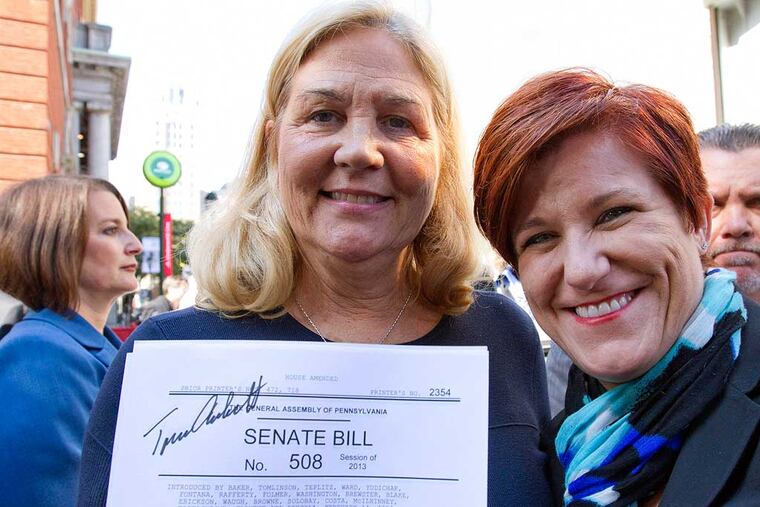Mumia's backers sue to overturn 'mental anguish' law limiting speech
Convicted cop killer Mumia Abu-Jamal is seeking to overturn a new state law that allows violent-crime victims to sue offenders whose speech continues to cause them "mental anguish."

Convicted cop killer Mumia Abu-Jamal is seeking to overturn a new state law that allows violent-crime victims to sue offenders whose speech continues to cause them "mental anguish."
In a lawsuit filed Monday in federal court in Harrisburg, Abu-Jamal's lawyers said the measure - signed in October - violates the First Amendment rights of prisoners and was specifically targeted to silence him.
Abu-Jamal, 60, is serving a life sentence at a state prison in Schuylkill County for the 1981 shooting death of Philadelphia Police Officer Daniel Faulkner.
"This law is clearly unconstitutional," said Bret Grote, legal director of the Pittsburgh-based Abolitionist Law Center. "The Pennsylvania legislature and Gov. Corbett wanted to use Mumia Abu-Jamal to score political points and passed a law that can't pass constitutional muster."
The law clears the way for crime victims to sue an offender whose conduct "perpetuates the continuing effect of the crime on the victim."
It also gives local district attorneys and the state attorney general grounds to seek an injunction against a prisoner preventing such speech.
But when he approved the measure last month during a signing ceremony in Philadelphia, Gov. Corbett left no question as to the one man he hoped the law would silence.
Speaking at the Center City intersection where Faulkner was gunned down, the governor said he hoped the law would curb the "obscene celebrity" cultivated by convicts like Abu-Jamal, who has become an international cause celebre since his conviction in 1982 and has claimed for decades in books, documentaries, and radio programs that he is an innocent victim of a racist justice system.
The Pennsylvania legislature fast-tracked the bill just days after Goddard College in Vermont last month played a speech Abu-Jamal recorded in prison at its commencement.
Though the speech made no reference to Faulkner and made only glancing reference to Abu-Jamal's time on death row, the college's decision drew the ire of the Fraternal Order of Police and Faulkner's widow, Maureen.
Both have long been critical of Abu-Jamal's outspokenness and sought to bar his past attempts to gain a public forum.
After publication of Abu-Jamal's first book in 1995, Live From Death Row, the FOP flew a plane with a banner denouncing its publisher, Addison-Wesley, over the company's corporate headquarters.
Abu-Jamal was joined in his lawsuit Monday by two other Philadelphia-area inmates convicted of murder as well as two nonprofit organizations that have long backed his cause. It names Pennsylvania Attorney General Kathleen G, Kane and Philadelphia District Attorney Seth Williams as defendants.
A hearing has not yet been set in the case.
215-825-2608 @jeremyrroebuck